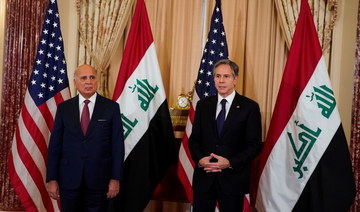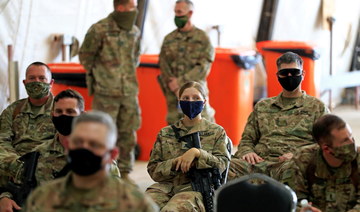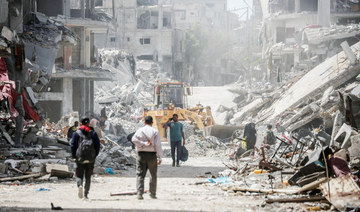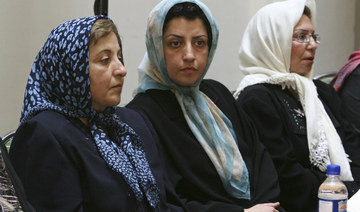WASHINGTON: President Joe Biden and Iraqi Prime Minister Mustafa Al-Kadhimi are expected to announce on Monday that they’ve come to an agreement to end the US military’s combat mission in Iraq by the end of the year, according to a senior Biden administration official.
The plan to shift the American military mission, whose stated purpose is to help Iraq defeat the Daesh group, to a strictly advisory and training role by year’s end — with no US troops in a combat role — will be spelled out in a broader communique to be issued by the two leaders following their White House meeting on Monday afternoon, said the official, who spoke on the condition of anonymity to discuss the yet to be announced plan.
The official said the Iraqi security forces are “battle tested” and have proved themselves “capable” of protecting their country. Still, the Biden administration recognizes that Daesh remains a considerable threat, the official said.
Indeed, the Daesh terror organization is a shell of its former self since it was largely routed on the battlefield in 2017. Still, it has shown it can still carry out high-casualty attacks. Last week, the group claimed responsibility for a roadside bombing that killed at least 30 people and wounded dozens in a busy suburban Baghdad market.
The US and Iraq agreed in April that the US transition to a train-and-advise mission meant the US combat role would end, but they didn’t settle on a timetable for completing that transition. The announcement comes less than three months before parliamentary elections slated for Oct. 10.
Al-Kadhimi faces no shortage of problems. Iranian-backed militias operating inside Iraq have stepped up attacks against US forces in recent months, and a series of devastating hospital fires that left dozens of people dead and soaring coronavirus infections have added fresh layers of frustration for the nation.
For Al-Kadhimi, the ability to offer the Iraqi public a date for the end of the US combat presence could be a feather in his cap ahead of the election.
Biden administration officials say Al-Kadhimi also deserves credit for improving Iraq’s standing in the Mideast.
Last month, King Abdullah II of Jordan and Egyptian President Abdel Fattah El-Sisi visited Baghdad for joint meetings — the first time an Egyptian president has made an official visit since the 1990s, when ties were severed after Saddam Hussein invaded Kuwait.
In March, Pope Francis made a historic visit to Iraq, praying among ruined churches in Mosul, a former IS stronghold, and meeting with the influential Shiite cleric Grand Ayatollah Ali Al-Sistani in the holy city of Najaf.
The US and Iraq have been widely expected to use the face-to-face meeting to announce plans for the end of the combat mission, and Al-Kadhimi before his trip to Washington made clear that he believes it’s time for the US to wind down the combat mission.
“There is no need for any foreign combat forces on Iraqi soil,” Al-Kadhimi said.
The US troop presence has stood at about 2,500 since late last year when former President Donald Trump ordered a reduction from 3,000.
The announcement to end the US combat mission in Iraq comes as the US is in the final stages of ending its war in Afghanistan, nearly 20 years after President George W. Bush launched the war in response to the Sept. 11, 2001, attacks on the United States.
The US mission of training and advising Iraqi forces has its most recent origins in former President Barack Obama’s decision in 2014 to send troops back to Iraq. The move was made in response to the Daesh group’s takeover of large portions of western and northern Iraq and a collapse of Iraqi security forces that appeared to threaten Baghdad. Obama had fully withdrawn US forces from Iraq in 2011, eight years after the US invasion.
The distinction between combat troops and those involved in training and advising can be blurry, given that the US troops are under threat of attack. But it is clear that US ground forces have not been on the offensive in Iraq in years, other than largely unpublicized special operations missions aimed at Daesh group militants.
Pentagon officials for years have tried to balance what they see as a necessary military presence to support the Iraqi government’s fight against IS with domestic political sensitivities in Iraq to a foreign troop presence. A major complication for both sides is the periodic attacks on bases housing US and coalition troops by Iraqi militia groups aligned with Iran.
The vulnerability of US troops was demonstrated most dramatically in January 2020 when Iran launched a ballistic missile attack on Al-Asad air base in western Iraq. No Americans were killed, but dozens suffered traumatic brain injury from the blasts. That attack came shortly after a US drone strike killed Iranian military commander Qassim Soleimani and senior Iraqi militia commander Abu Mahdi Al-Muhandis at Baghdad International Airport.
The US military mission since 2014 has been largely focused on training and advising Iraqi forces. In April, in a joint statement following a US-Iraqi meeting in Washington, they declared, “the mission of US and coalition forces has now transitioned to one focused on training and advisory tasks, thereby allowing for the redeployment of any remaining combat forces from Iraq” at a time to be determined later.
Monday’s communique is also expected to detail US efforts to assist the Iraqi government’s COVID-19 response, education system and energy sector.
Biden, Iraqi PM to announce end of US combat mission in Iraq
https://arab.news/z56br
Biden, Iraqi PM to announce end of US combat mission in Iraq

- Plan to shift the American military mission will be spelled out in a broader
- The Daesh is a shell of its former self since it was largely routed on the battlefield in 2017
Tent compound rises in Khan Younis as Israel prepares for Rafah offensive
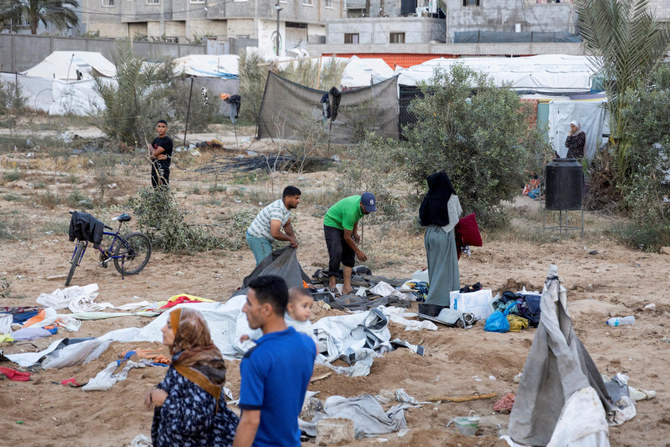
- Israel has said it plans to evacuate civilians from Rafah during an anticipated offensive on the southern city
- The Israel-Hamas war has killed more than 34,000 Palestinians
The tent construction is near Khan Younis, which has been targeted by repeated Israeli military operations over recent weeks. Israel has said it plans to evacuate civilians from Rafah during an anticipated offensive on the southern city, where hundreds of thousands of people have taken refuge during the war, now in its seventh month.
Also Monday, a failed rocket strike was launched at a base housing US-led coalition forces at Rumalyn, Syria, marking the first time since Feb. 4 that Iranian-backed militias have attacked a US facility in Iraq or Syria, a US defense official said. No personnel were injured in the attack, and no group has claimed responsibility for the attack.
The conflict has sparked regional unrest pitting Israel and the US against Iran and allied militant groups across the Middle East. Israel and Iran traded fire directly this month, raising fears of all-out war.
The war was sparked by the unprecedented Oct. 7 raid into southern Israel in which Hamas and other militants killed around 1,200 people, mostly civilians, and abducted around 250 hostages. Israel says militants are still holding around 100 hostages and the remains of more than 30 others.
The Israel-Hamas war has killed more than 34,000 Palestinians, according to local health officials, at least two-thirds of them children and women. It has devastated Gaza’s two largest cities and left a swath of destruction. Around 80 percent of the territory’s population have fled to other parts of the besieged coastal enclave.
The US House of Representatives approved a $26 billion aid package on Saturday that includes around $9 billion in humanitarian assistance for Gaza, which experts say is on the brink of famine, as well as billions for Israel. The US Senate could pass the package as soon as Tuesday, and President Joe Biden has promised to sign it immediately.
Iran’s foreign minister calls EU sanctions ‘regrettable’
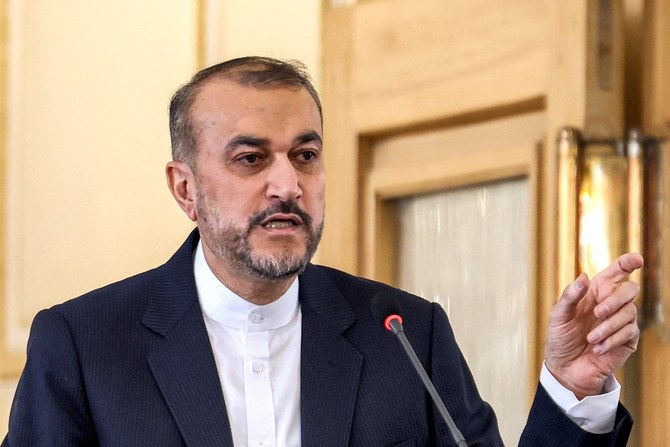
- EU foreign ministers agreed in principle to expand sanctions on Iran by agreeing to extend restrictive measures on Tehran’s weapons exports
DUBAI: European Union sanctions announced following Iran’s attack against Israel are “regrettable” because the country was acting in self-defense, Iran’s Foreign Minister Hossein Amirabdollahian posted on X on Tuesday.
Iran launched more than 300 drones and missiles on Israel in what it said was retaliation against a suspected Israeli bombing of its embassy compound in Damascus.
On Monday, EU foreign ministers agreed in principle to expand sanctions on Iran by agreeing to extend restrictive measures on Tehran’s weapons exports of any drone or missile to Iranian proxies and Russia.
“It is regrettable to see the EU deciding quickly to apply more unlawful restrictions against Iran just because Iran exercised its right to self-defense in the face of Israel’s reckless aggression,” Amirabdollahian said on X, before calling on the EU to apply sanctions on Israel instead.
More work will need to follow in Brussels to approve a legal framework before the expansion of the sanctions can take effect.
Israel’s Gaza war has negatively impacted human rights, says US report

- Rights issues include credible reports of unlawful killings, enforced disappearances and torture, says report
- Israeli military's conduct has come under scrutiny as its forces have killed over 34,000 in Gaza since Oct. 7
WASHINGTON: The war between Israel and Hamas that has killed tens of thousands of Palestinians in Gaza and resulted in a severe humanitarian crisis has had “a significant negative impact” on the human rights situation in the country, the US State Department said in its annual report on Monday.
Significant human rights issues include credible reports of arbitrary or unlawful killings, enforced disappearance, torture and unjustified arrests of journalists among others, said the State Department’s 2023 Country Reports on Human Rights Practices.
The report added that the Israeli government has taken some credible steps to identify and punish the officials who may have been involved in those abuses.
Israel’s military conduct has come under increasing scrutiny as its forces have killed 34,000 Palestinians in Gaza, according to the enclave’s health authorities, many of them civilians and children. The Israeli-occupied Gaza Strip has been reduced to a wasteland, and extreme food shortages have prompted fears of famine.
Israel launched its assault in response to a Hamas attack on Oct. 7, in which Israel says 1,200 people were killed.
Rights groups have flagged numerous incidents of civilian harm during the Israeli army’s offensive in Gaza, as well as raised alarm about rising violence in the Israeli-occupied West Bank, where Palestinian Health Ministry records show Israeli forces or settlers have killed at least 460 Palestinians since Oct. 7. But so far the Biden administration has said it has not found Israel in breach of international law.
Washington gives $3.8 billion in annual military assistance to its longtime ally. Leftist Democrats and Arab American groups have criticized the Biden administration’s steadfast support for Israel, which they say provides it with a sense of impunity.
But this month, President Joe Biden for the first time threatened to condition support for Israel, and insisted that it take concrete steps to protect humanitarian aid workers and civilians.
Israel’s Gaza war has negatively impacted human rights, says US report
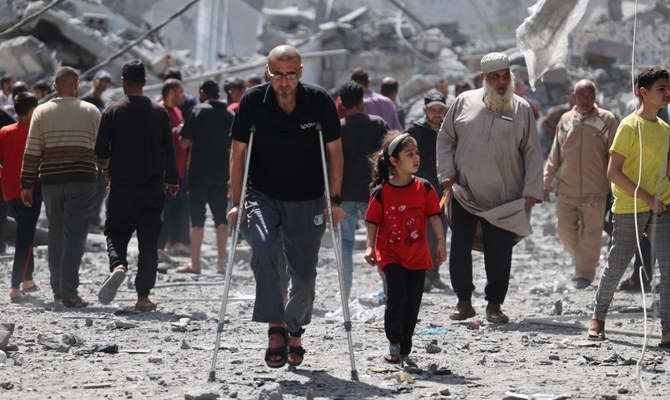
- The Israeli-occupied Gaza Strip has been reduced to a wasteland, and extreme food shortages have prompted fears of famine
WASHINGTON: The war between Israel and Hamas that has killed tens of thousands of Palestinians in Gaza and resulted in a severe humanitarian crisis has had “a significant negative impact” on the human rights situation in the country, the US State Department said in its annual report on Monday.
Significant human rights issues include credible reports of arbitrary or unlawful killings, enforced disappearance, torture and unjustified arrests of journalists among others, said the State Department’s 2023 Country Reports on Human Rights Practices.
The report added that the Israeli government has taken some credible steps to identify and punish the officials who may have been involved in those abuses.
Israel’s military conduct has come under increasing scrutiny as its forces have killed 34,000 Palestinians in Gaza, according to the enclave’s health authorities, many of them civilians and children. The Israeli-occupied Gaza Strip has been reduced to a wasteland, and extreme food shortages have prompted fears of famine.
Israel launched its assault in response to a Hamas attack on Oct. 7, in which Israel says 1,200 people were killed.
Rights groups have flagged numerous incidents of civilian harm during the Israeli army’s offensive in Gaza, as well as raised alarm about rising violence in the Israeli-occupied West Bank, where Palestinian Health Ministry records show Israeli forces or settlers have killed at least 460 Palestinians since Oct. 7. But so far the Biden administration has said it has not found Israel in breach of international law.
Washington gives $3.8 billion in annual military assistance to its longtime ally. Leftist Democrats and Arab American groups have criticized the Biden administration’s steadfast support for Israel, which they say provides it with a sense of impunity.
But this month, President Joe Biden for the first time threatened to condition support for Israel, and insisted that it take concrete steps to protect humanitarian aid workers and civilians.
Nobel laureate urges protest against Iran’s ‘war on women’
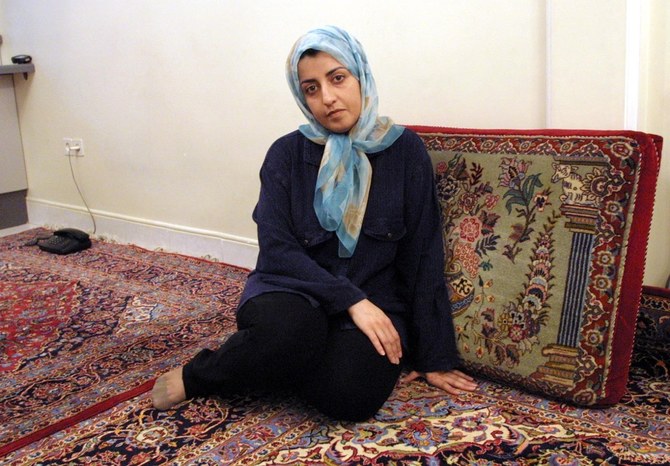
- Narges Mohammadi issues plea from Evin prison amid new crackdown by Tehran’s morality police
JEDDAH: Jailed Iranian Nobel laureate Narges Mohammadi urged Iranians on Monday to protest against the clerical regime’s “war against women” amid a new crackdown forcing women to cover their heads.
Mohammadi, who is being held in Evin prison in Tehran, called on Iranian women to share their stories of arrest and sexual assault at the hands of the authorities.
Iran launched a nationwide operation this month to enforce the wearing of the headscarf. Women have been arrested and taken to police stations by the morality police, and the Farsi hashtag meaning “war against women” has been trending on social media.
“People of Iran, I ask you, artists, intellectuals, workers, teachers, and students ... inside and outside the country to protest against this war against women,” Mohammadi said in a message from inside the prison. “Do not underestimate the power of sharing your experiences. Doing so will expose the misogynistic government and bring it to its knees.” She accused the authorities of bringing “a full-scale war against all women to every street in Iran.”
Mohammadi said she had been joined in jail by Dina Ghalibaf, a journalist and student who was arrested after accusing security forces on social media of putting her in handcuffs and sexually assaulting her during a previous arrest at a metro station. “For years, we have witnessed many women who have endured assault, abuse, and beatings by government agents,” Mohammadi said.
Mohammadi, 52, was awarded the Nobel Peace Prize last year in recognition of her campaign for human rights in Iran, which has led to her spending much of the past two decades in and out of jail. She has been imprisoned since November 2021 and has not seen her husband and twin children, who live in Paris, for several years.



